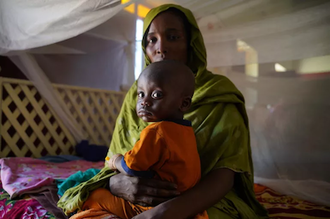Sudan: Famine confirmed in North Darfur

UNICEF/UN0836594/Zakaria: Hanona brings her child Maher to a nutrition centre in Abushok in North Darfur for health screening.
After more than 15 months of war in Sudan, a catastrophic combination of conflict, displacement and humanitarian access constraints has resulted in famine in a camp sheltering hundreds of thousands of displaced people in Sudan's North Darfur Region.
The Famine Review Committee (FRC)'s conclusion that there is famine in Zamzam camp, is the first determination of famine by the Committee in more than seven years, and only the third time a famine determination has been made since the monitoring system was created 20 years ago. The FRC warns that other parts of Sudan risk famine if concerted action is not taken.
The famine announcement confirms the fears of the humanitarian community and follows an IPC analysis in June showing a dramatic decline in food and nutrition security; with 755,000 people facing catastrophic conditions.
UNICEF and the UN World Food Programme (WFP) have been warning of the escalating risk to the people of Sudan, particularly children, if urgent aid cannot be delivered to communities trapped in conflict hotspots like Darfur, Khartoum, Kordofan and Al Jazirah. The situation remains critical across the whole country, with an estimated 730,000 children projected to suffer severe acute malnutrition (SAM) this year, the most life-threatening form of malnutrition.
A determination of famine means that people, including children, have already started dying of hunger and related conditions including malnutrition and infection. Unlike the Darfur crisis of twenty years ago, this conflict-fuelled hunger crisis spans the whole country including the capital Khartoum and Jazirah State, previously Sudan's breadbasket.
Severely restricted humanitarian access is one of the main drivers of the famine conditions in Zamzam. While UNICEF was able to deliver enough supplies of life-saving Ready-to-Use Therapeutic Food (RUTF) to treat approximately 4,000 severely acutely malnourished children to El Fasher in July, including an allocation for Zamzam camp, the continued lack of sustained, safe access means the needs remain huge and continued ability to deliver humanitarian supplies is unpredictable.
"We urgently need a massive expansion of humanitarian access so we can halt the famine that has taken hold in North Darfur and stop it sweeping across Sudan. The warring parties must lift all restrictions and open new supply routes across borders, and across conflict lines, so relief agencies can get to cut-off communities with desperately needed food and other humanitarian aid," said WFP Executive Director Cindy McCain. "I also call on the international community to act now to secure a ceasefire in this brutal conflict and end Sudan's slide into famine. It is the only way we will reverse a humanitarian catastrophe that is destabilizing this entire region of Africa."
"Today's news confirms some of our worst fears that famine is occurring in parts of Sudan and is inflicting unimaginable suffering on children and families who are already reeling from the impact of a horrific war," said UNICEF Executive Director Catherine Russell. "This famine is fully man-made. We again call on all the parties to provide the humanitarian system with unimpeded and safe access to children and families in need. We must be able to use all routes, across lines of conflict and borders. Sudan's children cannot wait. They need protection, basic services and most of all, a ceasefire and peace."
UNICEF and WFP continue to call on all parties to guarantee safe unhindered and sustained humanitarian access, to allow the humanitarian response to be further expanded and to allow the agencies to deliver at speed. The agencies also urge the international community to intensify their financial support for humanitarian efforts and use every diplomatic tool at their disposal to bring about an immediate ceasefire WFP and UNICEF have mobilised a large-scale humanitarian response with local and international partners, inside Sudan and in neighbouring countries where more than 2 million Sudanese have fled to safety.
Kayode Akintola, Head of Region for Africa for the international Catholic aid agency CAFOD, comments: "The international community has failed to prevent a foreseeable tragedy in Sudan, marked by apathy and an inadequate humanitarian response. The situation in Zamzam is the only one that the IPC (Integrated Food Security Phase Classification) could independently verify, but the lack of data hides the true extent of this crisis.
"Only a third of the required funding has been met, and efficient solutions like cash assistance remain underfunded. If nothing changes, countless other communities across Sudan will starve to death amidst the world's indifference.
"Supply routes to the White Nile state are cut off, affecting IDPs (internally displaced people), refugees, and host communities. The shortage of food and fuel means White Nile state could soon face famine where CAFOD is on the ground. We are working with partners to provide urgently needed cash voucher assistance for food, water and other necessities.
"To end this crisis, we urge the implementation of the Famine Review Committee's recommendations, the cessation of attacks on civilians, and the opening of humanitarian corridors. The international community must also scale up efforts to end hostilities and ensure transparent, rapid funding to local responders and mutual aid initiatives.
"To address the crisis, conflict parties must halt attacks on civilians, open the Adre crossing, create humanitarian corridors, ease bureaucratic procedures, and ensure safe commercial supply routes. The humanitarian community should prioritise cash assistance, increase funding to local actors, and enhance coordination efforts. The international community must reconvene to scale up humanitarian response, ensure unfettered access, and urgently disperse pledged funds."


















